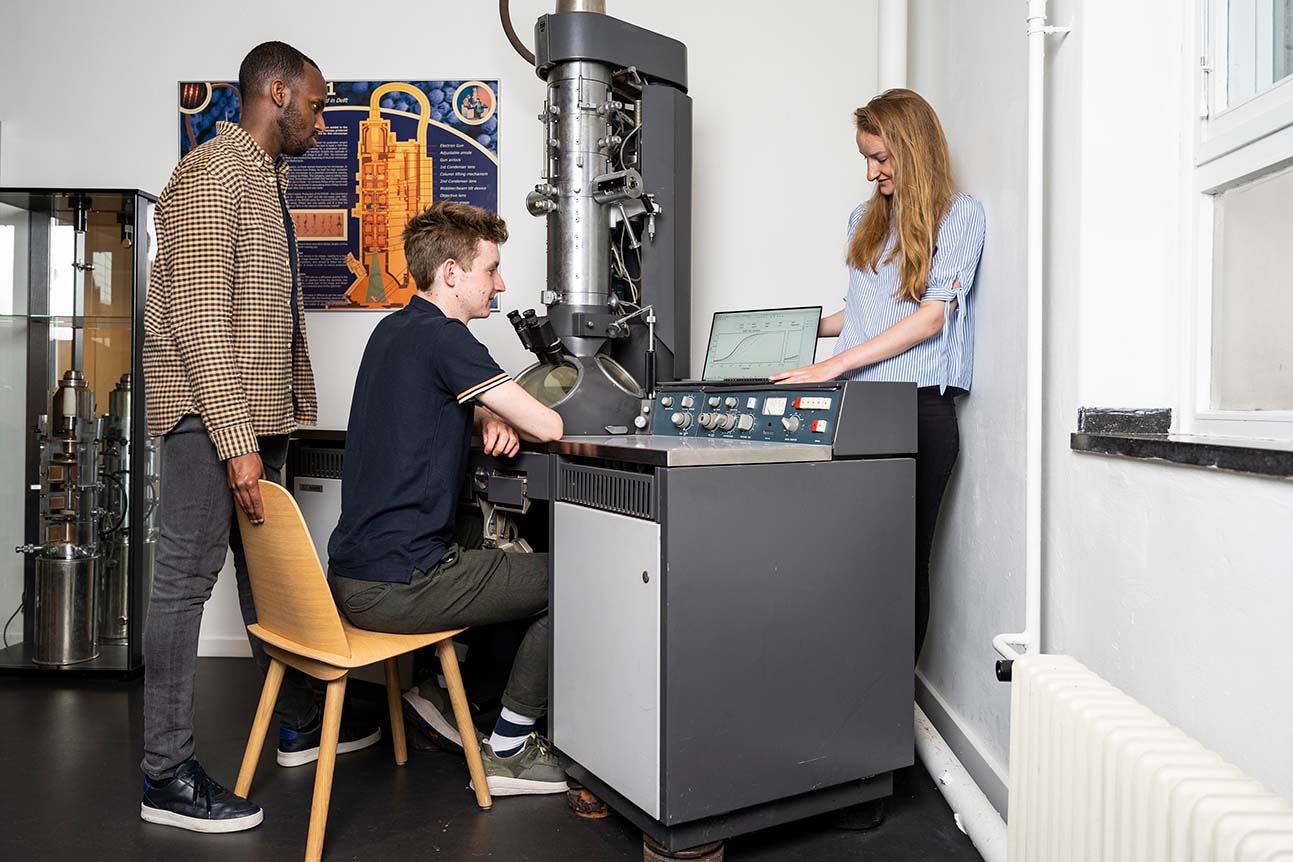Engineering with AI
TI-Mi-225
Note: there are exams in week 2.6. These are not in the normal exam week of week 2.10. If you are already planning your Christmas holidays, please take this into account!
Ultimately, one of the TU Delft’s objectives is that all students at TU Delft should be exposed to AI (Artificial Intelligence) education. That is why the TU Delft has recently launched 24 Delft AI Labs. Each faculty has now several AI labs, that aim to combine AI research with topics of interest from the faculty. For example, the faculty of Aerospace Engineering is investigating the use of graph neural networks to predict air traffic delays in a network of interconnected airports.
Students that complete this minor programme will - in their MSc programme of their faculty - gain access to the 15 EC course “Interdisciplinary Advanced Artificial Intelligence Project” (see TU Delft study guide). Together, this minor and this MSc course will allow you to do a MSc thesis project that combines AI with topics of interest of your faculty.
Furthermore, it is highly likely you will encounter AI techniques in your job after your studies. In this minor you will learn how to use AI techniques such as neural networks. At the end of the minor programme you will work together with an expert researcher from your faculty or one of the Delft AI Labs. Together with them you will develop or investigate an AI solution as part of the “Capstone Applied AI” project.
In this minor program you will also learn how AI and machine learning algorithms work and how you can apply them the right way. You will also learn the pros and cons of AI techniques, their limitations and possible associated ethical problems. You will get to know all the ins and outs of AI; you will be able to tune settings or to use specific AI algorithms using toolboxes, and will learn what is ‘under the hood’ of the AI toolkit.
By the end of this minor you will:
- know how to apply AI techniques in your specific study field,
- how to reformulate problems of your field such that they can be solved by AI algorithms,
- recognize the limits and failures of AI solutions and know how to try and fix them.
For whom?
This minor is available for bachelor’s students from the TU Delft, Leiden University, and Erasmus University of Rotterdam. Students from other universities are unfortunately not eligible to follow this minor. If you are a student from Leiden or Erasmus, please check the “thematic minor overview” to see whether you can apply for this minor (based on which faculty you study at).
All BSc students from TU Delft except Computer Science BSc students can enrol for this minor. If you do a double BSc degree that includes computer science (for example: math and computer science) you are also not allowed to take this minor.
Who cannot attend?
- Computer Science BSc students
- Double BSc degree students with Computer Science (such as math and CS),
- HBO students,
- Students that are not at TU Delft, Leiden University or Erasmus University Rotterdam
Information for bachelor’s students from Applied Mathematics (BSc TW):
The following course replacements are required for the BSc Technische Wiskunde (TW) students.
| Engineering with AI Minor (TI-Mi-225) course: | The content equivalent for BSc TW students: | To be replaced by: |
| TI3170TU Introduction to Python Programming | AM1090 Introduction to Programming | CSE2220 Signal Processing |
Prerequisites
Knowledge of university-level mathematics (calculus, linear algebra, probability, and statistics) is recommended. You are responsible to check that you have the required knowledge and acquire it (self study 15-20h). Especially for students from IDE / IO, TPM / TB, and BK / A+BE, Leiden and Erasmus, self-study in the summer may required, because not all linear algebra and statistics is covered in the BSc programme. You can find a detailed description of the self-study material here: https://studiegids.tudelft.nl/a101_displayCourse.do?course_id=66128
What will you learn
The main learning objectives are as follows, split per three core pillars:
- Computational thinking
The student will be able to explain the basic concepts of computational thinking and describe how algorithms operate on data.
- Artificial Intelligence
The student will be able to describe the fundamental concepts and techniques of AI, explain the possibilities and limitations of AI systems and the importance of their validation, and can apply at least one AI technique or analyse an AI application area, preferably in the field of their major.
- Societal impact
The student will be able to examine the technological, societal and regulatory perspectives on AI, assess the impact of deploying AI-based solutions and interventions on individuals, organizations and society, and apply ethical considerations in the design of its own AI system in the field of his/her major.
Course overview
Below is a short description of all courses. For more information, please see the studyguide. (Note: The Study guide currently contains information about the 2023-2024 minor programme and earlier editions. The description of the courses in the new minor programme of 2024-2025 will become available soon.)
Quarter 1
[TI3170TU] Introduction to Python Programming for AI (5 EC)
The course aims at achieving a programming level that is needed to be able to implement AI algorithms. You will be able to work with external libraries, which can also be applied to the use of popular AI packages used by academia and industry.
[TI3145TU] Machine Learning and Introduction to AI (5 EC)
In this course we will give you a brief introduction and overview of the field called AI – artificial intelligence. In the rest of the course we focus on machine learning: how algorithms learn from data. You will learn the fundamental concepts of machine learning, and various machine learning algorithms, such as linear regression, k-nearest neighbors, support vector machines and neural networks. You will learn how to train and fine-tune machine learning algorithms on datasets using the scikit-learn toolbox in Python.
[TI3140TU] Introduction to Engineering Responsible AI (5 EC)
In this course, you will learn about the philosophical perspectives on AI and responsible AI engineering, as well as examine AI`s impact on society through a range of contemporary case studies. You will look into the cultural, institutional, environmental and political dimensions of AI engineering and will learn to reason critically about the use and development of AI-based technologies.
Quarter 2
[TI3160TU] Natural Language Processing (5 EC)
This course provides an introduction to natural language processing (NLP), covering both theoretical concepts and practical applications of NLP techniques. Through this course, you will gain a foundational understanding of the fundamental concepts related to NLP and become familiar with various NLP techniques. Additionally, you will have the opportunity to gain hands-on experience implementing NLP techniques using programming tools in Python. Furthermore, this course will expose you to some of the latest NLP models currently used in production, including BERT, transformers, and large language models. You will also explore real-world applications of NLP, such as chatbots, to gain a better understanding of the practical use of NLP techniques.
[TI3155TU] Deep Learning (5 EC)
In this course, we will look at the foundations of deep learning, that is modern, multi-layered neural networks that have shown remarkable success in various tasks with large datasets. You will learn about core concepts of different deep learning techniques such as Multilayer Perceptron, Convolutional Networks and Recurrent Networks, through practical applications in simple, real-world scenarios. You will work at the model implementation using PyTorch library in Python.
[TI3165TU] Capstone Applied AI project (5 EC)
In this course, you will apply the topics learned in the previous minor courses on a group project with regards to your field of study. The project will be supervised by faculty staff and PhD students from the major field of study of your major.
Education methods
Register for this minor
To register, please follow the procedure described at Minors - English page, or Minors- Dutch page.
Participating institutions
Faculty of Electrical Engineering, Mathematics, and Computer Science.
Frequently asked questions
Can I follow this minor if I am an MSc student?
No, the Engineering with AI minor is only for BSc students.
Can I follow this minor If I am not a student from TU Delft?
Yes, if you are from Erasmus or Leiden, but please check the “thematic minor overview” to see whether you can apply for this minor (based on which faculty you study at).
Can I replace the course on Python programming?
Some students have already done a course on Python in their bachelor’s programmes and wonder whether they can get a replacement for the Python course in this minor programme (TI3170TU). Our answer: we cannot offer a replacement for TI3170TU, unless you are a Mathematics student from the TU Delft (in which case you should follow the replacement table presented above).
I did a programming course (or other course) at faculty XYZ, can I replace a course in the minor programme by this course?
No.
I have followed the minor previous academic year, but I did not finish it. Do I need to enrol again?
You don't have to enrol again for the minor. You will automatically be registered for next years, and you can follow the courses of the minor. You however still need to register for the exam, Brightspace, etc. like when you are normally taking a course.
I have followed the minor previous academic year, but I did not finish it. However, the courses have changed. What do I need to do to finish the minor?
- The minor has changed a lot
- EC’s you have obtained in previous years remain valid, even if the courses are not given this year
- Algorithms and Data Structures
-> Replace by Natural Language Processing or Deep Learning
- Capstone project 10 EC
-> Replace by Capstone project 5 EC variant + Natural Language Processing (5 EC) or Deep Learning (5 EC)
- You have to replace all EC’s (so in the end you should have 30 EC). You cannot use NLP or DL as a replacement twice.
- You don't need to enroll for these courses (you are automatically enrolled for all courses if you were registered in previous years) but you do need to register for the exam and Brightspace!


